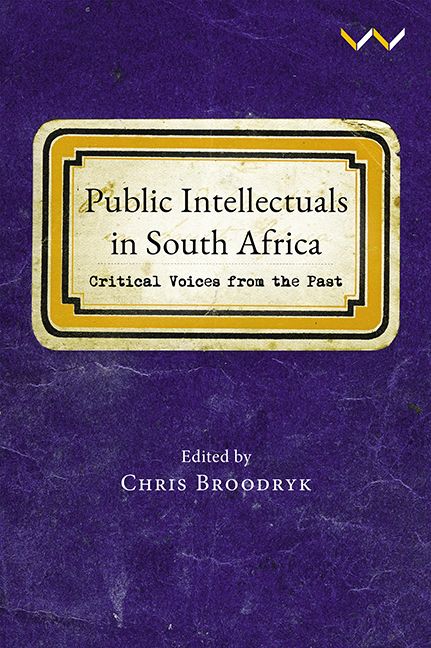Book contents
- Frontmatter
- Contents
- Acknowledgements
- Introduction: The Prismatic Nature of Public Intellectualism
- Chapter 1 Recalibrating the Deep History of Intellectual Thought in the KwaZulu-Natal Region
- Chapter 2 Elijah Makiwane and Early Black South African Public Intellectualism
- Chapter 3 Black Art Criticism in The Bantu World during the 1930s
- Chapter 4 In Conversation with the Nation: Sowetan’s Maverick Editor Aggrey Klaaste
- Chapter 5 William Pretorius and the Public Intellectualism of the Film Critic
- Chapter 6 Cultural Policy and the Arts: Mewa Ramgobin and Public Dialogue
- Chapter 7 ‘Kaalgat Critique’: The Public Intellectualism of Koos Roets as Afrikaans Satirist
- Chapter 8 The Public Intellectualism of Artivist Mandisi Sindo
- Chapter 9 The Janus-Faced Public Intellectual: Dr Thomas Duncan Greenlees at the Institute for Imbecile Children, 1895–1907
- Index
Chapter 4 - In Conversation with the Nation: Sowetan’s Maverick Editor AggreyKlaaste
Published online by Cambridge University Press: 16 July 2022
- Frontmatter
- Contents
- Acknowledgements
- Introduction: The Prismatic Nature of Public Intellectualism
- Chapter 1 Recalibrating the Deep History of Intellectual Thought in the KwaZulu-Natal Region
- Chapter 2 Elijah Makiwane and Early Black South African Public Intellectualism
- Chapter 3 Black Art Criticism in The Bantu World during the 1930s
- Chapter 4 In Conversation with the Nation: Sowetan’s Maverick Editor Aggrey Klaaste
- Chapter 5 William Pretorius and the Public Intellectualism of the Film Critic
- Chapter 6 Cultural Policy and the Arts: Mewa Ramgobin and Public Dialogue
- Chapter 7 ‘Kaalgat Critique’: The Public Intellectualism of Koos Roets as Afrikaans Satirist
- Chapter 8 The Public Intellectualism of Artivist Mandisi Sindo
- Chapter 9 The Janus-Faced Public Intellectual: Dr Thomas Duncan Greenlees at the Institute for Imbecile Children, 1895–1907
- Index
Summary
In the late 1980s the editor of Sowetan, Aggrey Klaaste,began a project to intervene in the fraught political situation in SouthAfrica. Protest against the apartheid state in townships across the countrywas ongoing, two states of emergency had been declared and competingpolitical groups warred with one another in deadly clashes. Klaaste'sproject sought to rebuild structures in black communities and to inspirelocal community projects. Klaaste called his idea‘nation-building’ and promoted it through columns andarticles, as well as events and community projects spearheaded by thenewspaper.
Nation-building represented a significant shift from the radical activism ofSowetan's newsroom, inherited from itspredecessor paper, The World, which had aligned itself withthe Black Consciousness struggles of the 1970s. Nationbuilding wasstrenuously opposed by militant journalists at the newspaper, as well as bymany political activists, who argued that apartheid needed to be torn downbefore any ‘building’ could happen. As Phakama Mbonambiwrites: ‘In an atmosphere where the young lions exerted power througha box of matches, Klaaste's thinking was totally unconventional– perhaps even dangerous, given that it deviated from [the] receivedwisdom of waging the struggle right down to the last manstanding.’
However, by the 1990s, nation-building was integral to the ethos of thenewspaper. Sowetan, successor to a long line ofblack-readership newspapers, increased in influence as circulation soared inthe early 1990s. It became the largest readership daily in the country,overtaking the white-readership The Star, and was widelydistributed among black urban readers. Sowetan journalistswere closely connected to its township public, sharing in their livesthrough living and working in Soweto. But the newspaper's influenceextended beyond the geographical borders of Soweto as it expanded into anational paper and was circulated in black residential areas across thecountry.
Sowetan's nation-building project was thus asignificant moment in South African public life. As I have argued elsewhere,nation-building allowed a collective re-imagining of black citizenship andpositioned black South Africans as the leading public for an inclusivecitizenry, which could unite competing political ideologies, religions andcultural loyalties, and also include white South Africans. The newspaperthus convened ‘a black public positioned as thepublic, and imagined as the nation’.
- Type
- Chapter
- Information
- Public Intellectuals in South AfricaCritical Voices from the Past, pp. 86 - 107Publisher: Wits University PressPrint publication year: 2021



